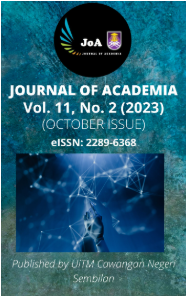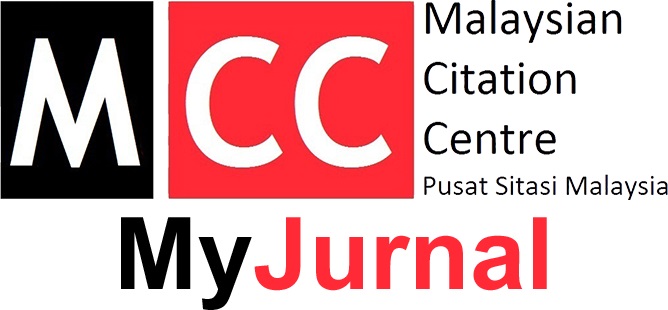THE RELATIONSHIP BETWEEN STATE OF MENTAL HEALTH AND FACTORS AFFECTING MENTAL HEALTH ON ACADEMIC PERFORMANCE
Keywords:
Mental Health, Academic Performance, Covid-19Abstract
In March 2020, all educational institutions such as schools and universities were closed due to curb the spread of COVID-19 in Malaysia. Online learning has led to mental health issues among students that can affect their abilities and their academic performance. The aim of this study is to identify the relationship between mental health and academic performance among third-year students at UTHM. This study is using quantitative methods and questionnaires were distributed in order to collect the data. The study will develop valid and reliable scales in order to measure the factors in the relationship between mental health issues and academic performance among third-year students in UTHM. This study can provide many benefits both outside and within the institution, especially among students and universities. the sample size for this study is 375 respondents from undergraduate students in UTHM. The response rate for this research is 23.46%. All the data was collected and analyzed by using the Statistical Package for Science Social (SPSS). Based on the descriptive analysis results, the level of feeling sad and depressed of students is the lowest and the nominal factors that affect students’ mental health are needed to do a part-time job due to financial difficulties of the family members. The level of mental health has no significant relationship with the effect on academic performance. While the factors that affect their mental health have a significant relationship with the effect on their academic performance. This research might be useful for future studies which will be focus on identifying the antecedent of the mental health and prevention methods solve the matter. The limitation of this research is the management of time and develop more relevant and valid questionnaires.
References
Adeoye-Agboola, D., & Evans, H. (2015). The relationship between anxiety and academic performance of postgraduate international students in a British University: A cross-sectional quantitative design. Science Journal of Public Health, 3(3), 331-338. https://doi.org/10.11648/j.sjph.20150303.15.
Ahmadi, A., Mustaffa, M. S., Haghdoost, A. A., & Alavi, M. (2014). Mindfulness and related factors among undergraduate students. Procedia-Social and Behavioral Sciences, 159, 20-24. https://doi.org/10.1016/j.sbspro.2014.12.321.
Ahuja, R. (2010). Research Methodology. New Delhi: Rawat Publication. Pp 27-32. ISBN: 8170336538.
Al-Kumaim, N. H., Alhazmi, A. K., Mohammed, F., Gazem, N. A., Shabbir, M. S., & Fazea, Y. (2021). Exploring the impact of the COVID-19 pandemic on university students’ learning life: An integrated conceptual motivational model for sustainable and healthy online learning. Sustainability (Switzerland), 13(5), 1–20. https://doi.org/10.3390/su13052546
Allen, M. (2017). The sage encyclopedia of communication research methods (Vols. 1-4). Thousand Oaks, CA: SAGE Publications, Inc. https://doi.org/10.4135/9781483381411.
Bell. E., Harley. B., and Bryman. A. (2020). Business Research Methods. Oxford University Press. ISBN: 9780198869443.
Bolinski, F., Boumparis, N., Kleiboer, A., Cuijpers, P., Ebert, D. D., & Riper, H. (2020). The effect of e-mental health interventions on academic performance in university and college students: a meta-analysis of randomized controlled trials. Internet Interventions, 20, 100321. https://doi.org/10.1016/j.invent.2020.100321.
Bostani, M., Nadri, A., & Nasab, A.R. (2014). A study of the relation between mental health and academic performance of students of the Islamic Azad University Ahvaz branch. Procedia - Social and Behavioral Sciences 116, 163–165. https://doi.org/10.1016/j.sbspro.2014.01.186.
Chernoff, C. (2013). Conflict Theory of Education. In J. Ainsworth (Ed.), Sociology of Education: An A-to-Z Guide (pp. 145-147). SAGE Publications.
Ghani, A. (2013). Gender Identity Disorder is Not Simply Two in One. IIUM Medical Journal Malaysia, 12(2). https://doi.org/10.31436/imjm.v12i2.517.
Hamdani, M. R., Wallin, A., Ashkanasy, N. M., & Fenton-O’Creevy, M. (2023). Common Methodological Issues in Quantitative Management Education Research and Recommendations for Authors. Journal of Management Education. https://doi.org/10.1177/10525629231186158.
Healthline (2018). Social Anxiety Disorder: Causes, Symptoms & Diagnosis. https://www.healthline.com/health/anxiety/social-phobia. [Access online 2 June, 2021].
Honicke, T., & Broadbent, J. (2016). The influence of academic self-efficacy on academic performance: A systematic review. Educational Research Review, 17, 63-84. https://doi.org/10.1016/j.edurev.2015.11.002.
Johnston, M. P. (2014). Secondary data analysis: A method of which the time has come. Qualitative and quantitative methods in libraries, 3(3), 619-626. ISSN 2241-1925.
Khalid, F. M., Suman, N. A. A., Rasid, N. A., Mohamad, N. A., & Ghazali, N. N. N. (2016). Depression & Academic Performance: A Case Study. In International Symposium & Exhibition on Business and Accounting (pp. 1-7).
Kohn, J. P., & Frazer, G. H. (1986). An academic stress scale: Identification and rated importance of academic stressors. Psychological reports, 59(2), 415-426. https://doi.org/10.2466/pr0.1986.59.2.415.
Kunal, S., Gupta, K., & Ish, P. (2021). COVID-19 variants in India: Potential role in second wave and impact on vaccination. Heart & Lung: The Journal of Cardiopulmonary and Acute Care, 50(6), 784-787. https://doi.org/10.1016/j.hrtlng.2021.05.008.
Macnamara, B. N., & Burgoyne, A. P. (2023). Do growth mindset interventions impact students’ academic achievement? A systematic review and meta-analysis with recommendations for best practices. Psychological Bulletin, 149(3-4), 133. https://doi.org/10.1037/bul0000352.
Mirza, A. A., Baig, M., Beyari, G. M., Halawani, M. A., & Mirza, A. A. (2021). Depression and anxiety among medical students: a brief overview. Advances in Medical Education and Practice, 393-398. https://doi.org/10.2147/AMEP.S302897.
Narad, A., & Abdullah, B. (2016). Academic performance of senior secondary school students: Influence of parental encouragement and school environment. Rupkatha Journal on Interdisciplinary Studies in Humanities, 8(2), 12–19. https://doi.org/10.21659/rupkatha.v8n2.02
Nelson, R. (2019). Mental Health Care Is Lacking in Children and Adolescents. AJN The American Journal of Nursing, 119(7). https://doi.org/10.1097/01.NAJ.0000569416.59046.ed.
New Straits Time (2020). [Breaking] 3 coronavirus cases confirmed in Johor Baru. (n.d.). https://www.nst.com.my/news/nation/2020/01/559563/breaking-3-coronavirus-cases-confirmed-johor-baru. [Access online on May 11, 2021].
Patiyal, S., Choudhary, M., & Mehta, S. (2018). Impact of mental health on academic performance of students. Indian Journal of Health & Wellbeing, 9(5), 770-772. ISSN 2321-3698.
Ching, P. W., Lee, C. K. C., & Ong, T. P. (2012). Undergraduates' perception on causes, coping and outcomes of academic stress: Its foresight implications to university administration. International Journal of Foresight and Innovation Policy, 8(4), 379 - 403. https://doi.org/10.1504/ijfip.2012.049809.
Rohaiza, M.I., (2022). Exploring the impact of stressor on academic performance among higher education students. conference: International Conference on Sustainable Practices, Development and Urbanization. https://doi.org/10.15405/epms.2022.10.23.
Shamsuddin, K., Fadzil, F., Ismail, W. S. W., Shah, S. A., Omar, K., Muhammad, N. A., ... & Mahadevan, R. (2013). Correlates of depression, anxiety and stress among Malaysian university students. Asian Journal of Psychiatry, 6(4), 318-323. https://doi.org/10.1016/j.ajp.2013.01.014.
William G. Zikmund. (2003). Business Research Methods, Thomson/South-Western, 2003. ISBN 0030350840, 9780030350849.
Downloads
Published
Issue
Section
License
Copyright (c) 2023 Journal of Academia

This work is licensed under a Creative Commons Attribution-NonCommercial-NoDerivatives 4.0 International License.












